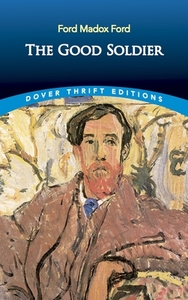Take a photo of a barcode or cover
I don't think the book aged well. All the "mistery" that was advertised was the main character rambling on and on about a load of inane things boring me out of my mind. I did not understood or liked any of the characters.
challenging
emotional
slow-paced
Plot or Character Driven:
A mix
2.5 ⭐️
A really great plot and narrative style but my god this book was unbearably sexist
A really great plot and narrative style but my god this book was unbearably sexist
So, I have always wanted to read this book and was really excited when I found this on my program this semester.
This may be why when it finally came to it, it felt underwhelming. "The Good Soldier" is the story of Edward Ashburnham, this compulsive cheater with a heart of gold, Leonora, his _cruel_ Catholic wife who just doesn't _understand_ him; Florence, the narrator's sociopathic wife, and the narrator who is an oblivious dude who thinks they're all having a mery good time. Oh, and his wife is cheating on him with Edward, which makes him hate his wife, but not Edward.
This book is beautifully structured, as well as methodical in its digressing in that all of its digressing is strategically placed. The narration is non-linear, speculative and unsure of its speculations. It illustrates the claustrophobia of the mind in trying to figure other people out, people you thought you knew- and the frustrated results.
I'm sure it must've been all the rave when it first came out, but since then there have been plenty of books making use of this same narrative resources with a story far more compelling.
The characters are filtered by the idiot narrator's point of view, still it is easy to disagree with his comments. That is perhaps a virtue of this book- even though the reader should be expected to sympathize with the narrator, he's so bland we come to sympathize with just anybody but him.
In our class discussion, many men seemed to sympathize with Edward. Which is to say, they would do the same despicable things if given the opportunity, even though they would never be given the opportunity. Consequently they are more John Dowell than they will ever be Good Soldiers, since John Dowell is just as lacking in morals as Edwards, though lacking in looks too.
There is something peculiar about the fascination Dowell has for Ashburnham, as if his philandering represented an inarticulate greatness one should bow to, and by which one should be moved.
It's rather like Nick Carraway's narration of Gatsby, only slightly less gay and with more solemnity. Of course, this book's depiction of women is way more interesting than in The Great Gatsby- if somewhat bitter.
Yes, Florence's lies and defiant manners may be condemnable- yet there's no denying her complex nature, the thoroughly American pragmatic whose schemes in the end of the day prove pathetic.
Leonora is examined to her Catholic bones and tough nature- and, despite the unfavorable characterization attributed to her, she remains both the most sensible and idealistic character. This may sound like a contradiction, but in the world of The Good Soldier it makes perfect sense that the one with religious beliefs be also the most grounded. The others are just acting randomly.
That Leonora should be villainized by the narrative while the peculiar nature of the Good Soldier glorified...Dowell's narration of course says that Edward was too sentimental for this world... There are indeed great sufferers whom the world ruins, but Edward's eighteenth century affairs and vicious spending happened due to an innate boredom seeking an out, not some noble quest. Boredom of course comes from one's own boring thoughts. Everyone knows boring people are incapable of greatness.
And then comes the final blow- Ashburnham falls for #wait for it... this girls he's helped raised. Her name is Nancy Rufford and she's a complete idiot- although, again, her idiocy is given a proper backstory so she does not seem totally out of the left field. Points for portrayal of women.
Anyway, even Edward knows this love is perverted and wrong, so he does his best not to do anything about it and dies of it.
See, my problem is how much the book demands that we pity him for this. Like, dude, I'm not going to give this guy a prize for having the basic human decency of not seducing someone who calls him "Uncle Edward". He did the bare minimum yet the reader is supposed to find it sad. It's not sad- it's turbulent, sort of icky, but not sad.
All in all, this is an interesting book and I'm glad to have read it, but then it is not something I'll be thinking about next week.
This may be why when it finally came to it, it felt underwhelming. "The Good Soldier" is the story of Edward Ashburnham, this compulsive cheater with a heart of gold, Leonora, his _cruel_ Catholic wife who just doesn't _understand_ him; Florence, the narrator's sociopathic wife, and the narrator who is an oblivious dude who thinks they're all having a mery good time. Oh, and his wife is cheating on him with Edward, which makes him hate his wife, but not Edward.
This book is beautifully structured, as well as methodical in its digressing in that all of its digressing is strategically placed. The narration is non-linear, speculative and unsure of its speculations. It illustrates the claustrophobia of the mind in trying to figure other people out, people you thought you knew- and the frustrated results.
I'm sure it must've been all the rave when it first came out, but since then there have been plenty of books making use of this same narrative resources with a story far more compelling.
The characters are filtered by the idiot narrator's point of view, still it is easy to disagree with his comments. That is perhaps a virtue of this book- even though the reader should be expected to sympathize with the narrator, he's so bland we come to sympathize with just anybody but him.
In our class discussion, many men seemed to sympathize with Edward. Which is to say, they would do the same despicable things if given the opportunity, even though they would never be given the opportunity. Consequently they are more John Dowell than they will ever be Good Soldiers, since John Dowell is just as lacking in morals as Edwards, though lacking in looks too.
There is something peculiar about the fascination Dowell has for Ashburnham, as if his philandering represented an inarticulate greatness one should bow to, and by which one should be moved.
It's rather like Nick Carraway's narration of Gatsby, only slightly less gay and with more solemnity. Of course, this book's depiction of women is way more interesting than in The Great Gatsby- if somewhat bitter.
Yes, Florence's lies and defiant manners may be condemnable- yet there's no denying her complex nature, the thoroughly American pragmatic whose schemes in the end of the day prove pathetic.
Leonora is examined to her Catholic bones and tough nature- and, despite the unfavorable characterization attributed to her, she remains both the most sensible and idealistic character. This may sound like a contradiction, but in the world of The Good Soldier it makes perfect sense that the one with religious beliefs be also the most grounded. The others are just acting randomly.
That Leonora should be villainized by the narrative while the peculiar nature of the Good Soldier glorified...Dowell's narration of course says that Edward was too sentimental for this world... There are indeed great sufferers whom the world ruins, but Edward's eighteenth century affairs and vicious spending happened due to an innate boredom seeking an out, not some noble quest. Boredom of course comes from one's own boring thoughts. Everyone knows boring people are incapable of greatness.
And then comes the final blow- Ashburnham falls for #wait for it... this girls he's helped raised. Her name is Nancy Rufford and she's a complete idiot- although, again, her idiocy is given a proper backstory so she does not seem totally out of the left field. Points for portrayal of women.
Anyway, even Edward knows this love is perverted and wrong, so he does his best not to do anything about it and dies of it.
See, my problem is how much the book demands that we pity him for this. Like, dude, I'm not going to give this guy a prize for having the basic human decency of not seducing someone who calls him "Uncle Edward". He did the bare minimum yet the reader is supposed to find it sad. It's not sad- it's turbulent, sort of icky, but not sad.
All in all, this is an interesting book and I'm glad to have read it, but then it is not something I'll be thinking about next week.
emotional
mysterious
sad
tense
medium-paced
Plot or Character Driven:
Character
Strong character development:
Complicated
Loveable characters:
No
Flaws of characters a main focus:
Yes
This is the story of two couples and their complicated relationship, told in hindsight after two of the foursome have died. The "good soldier", Edward, is highly admired by the narrator, despite Edward's despicable tendencies to love affairs, including one with the narrator's wife. The narrator admires him to the point of near worship, and I found it very difficult to understand why.
This was not a fun book to read. I felt like the narrator was kind of a big dumbo who'd been hoodwinked by this other couple, and then, upon learning the truth, he admired them even more for tricking him.
Food: Meat that's turned rancid, presented as a delicious meal. You trust the chef that they they're being honest, but something stinks.
This was not a fun book to read. I felt like the narrator was kind of a big dumbo who'd been hoodwinked by this other couple, and then, upon learning the truth, he admired them even more for tricking him.
Food: Meat that's turned rancid, presented as a delicious meal. You trust the chef that they they're being honest, but something stinks.
A tragic story, but I could not have sympathy for any of the characters.
I was utterly, completely lost through the entire book. Not only was it hard to separate and define the primary characters but it was almost impossible to discern the identity of the narrator and his relation to the various characters. The narrative jumped around in nearly a "stream-of-consciousness" fashion. The chronology darted forward only to be yanked back in head-spinning motions that exacerbated my confusion. There are very few books that enjoyed less than this one.
I do not recommend it at all.
I do not recommend it at all.
"The Good Soldier" is what "[b:Revolutionary Road|48328|Revolutionary Road|Richard Yates|http://photo.goodreads.com/books/1170354199s/48328.jpg|1235136]" written by Waugh would read like.
challenging
dark
emotional
reflective
medium-paced
Plot or Character Driven:
Character
Strong character development:
Complicated
Loveable characters:
No
Diverse cast of characters:
No
Flaws of characters a main focus:
Yes
Moderate: Death, Infidelity, Suicide



